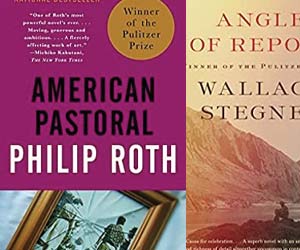American Pastoral: American Trilogy 1 (Pulitzer Prize Winner) (Vintage International)
(Part of the Complete Nathan Zuckerman (#6) Series, The American Trilogy (#1) Series, and The American Trilogy (#1) Series)
Select Format
Select Condition 
Book Overview
PULITZER PRIZE WINNER - NATIONAL BESTSELLER - From one of the most acclaimed writers of the twentieth century--a compulsively readable elegy for America's promises of prosperity, civic order, and... This description may be from another edition of this product.
Format:Paperback
Language:English
ISBN:0375701427
ISBN13:9780375701429
Release Date:February 1998
Publisher:Vintage
Length:423 Pages
Weight:0.78 lbs.
Dimensions:8.0" x 0.8" x 5.2"
Customer Reviews
4 ratings
Not the Sixties, far more timeless
Published by Thriftbooks.com User , 20 years ago
My initial reaction to AMERICAN PASTORAL was that it was a search to understand a life characterized by a shell of outward perfection hiding unimaginable family horror, one which mirrored America?s own wrenching progress from liking Ike to dissing Dick. I loved the rhythm of the probing, uncertain prose, but like a lot of readers (apparently), felt it rambled at times. Then, on the advice of a friend who had read the book a second time, I went back to the section on Zuckerman?s high school reunion, the conversation with Jerry Levov about his brother the Swede and, in particular, Zuckerman's own thoughts about sharing the book he had written about the Swede with Jerry before submitting it for publication (chronologically, the end of the book). Doing that completely threw my original opinion for one big loop, as I realized the Swede's story was in fact the product of Zuckerman's imagination and not the imparted truth of an omniscient narrator, as I had somehow managed to lull myself into believing. Instead, AMERICAN PASTORAL became the story of a literally gutted writer (he's had his prostate?and many might say, for Zuckerman, his Muse--removed) paying homage to his craft. Except for the general fact that his daughter Merry bombed a local post office, the Swede's whole story in Book 2 is a fabrication, ultimately saying more about the writer?s power to move, shock and tell a damn good story than it does about Seymour Levov and America in the Sixties. In that regard, the book?s two most powerful conceits are the passionate kiss during Merry's 11th summer and the Swede?s encounters with Rita Cohen. Both are charged with sexual grotesquery, and both are so at odds with anything we actually do know about the Swede that you have to wonder if they are only the product of Zuckerman's musings. But why would Zuckerman fabricate such shocking scenes about one of the nicest guys you?ll ever find in modern literature? That's what I could not figure out. And I concluded it?s because they're not for figuring out, just as great stories and the art of great storytelling are not for figuring out, but for stirring emotion and provoking thought. And, in the case of AMERICAN PASTORAL, not on such relative ephemera as the dysfunction of Sixties America, but on timeless subjects of fate, shifting fortune, family and loss that are more the province of Greek or Shakespearean or Biblical tragedy. As I was reading AP, Merry's quick unravelling unnerved me no end, both because of the idea that it could happen to any family, and because I have my own daughter, making even the slightest analogies to Merry all the scarier. But as I finished the book, and especially after I?d re-read the reunion episode, the character I kept thinking about was Lou, who Zuckerman portrays as a kind of loveable, old-world, avuncular character when he is no doubt (as Zuckerman's imagined conversation with Jerry about Lou?s portrayal suggests) a ... of an employer, husband and father. T
getting people wrong...
Published by Thriftbooks.com User , 23 years ago
The central dillemma of "American Pastoral" is that the "ability to penetrate the interior of people" is beyond most people. Apparently this is true of people and books as well. Since starting this wonderful, passionate, infuriating novel, I have often returned to the same page, the same paragraph rereading what serves as the thematic statement of the novel."You fight your superficiality, your shallownes, so as to try and come at people without unreal expectations, without an overload of bias or hope or arrogacnce...take them on with an open mind, as equals man to man, as we used to say, and yet you never fail to get them wrong." There it is, simple and straight forward. Phillip Roth is a very giving novelist. He states his point. Not just once, but again and again he echos this sentiment. And still people never fail to get this book wrong.The superficiality is to take this book as the tale of the Swede's tragic undoing. Or to take it as a recounting of Merry's misguided rebellion. Or even of Nathan Zuckerman's obsessions. This is a book about how the self is infinitely unknowable. How one can never truly understand oneself, much less others. What makes this novel so brilliant, in my humble opinion, is not simply the very true message the book carries. In the hands of a lesser writer, this could come off as a platitude, a cliche, so overstated as to become meaningless. Instead, Roth gives you a collection of dazzilingly complicated characters, beyond simple definition, only knowable through the words of themselves or others, but unknowable all the time. One reader complained of being frustrated with not knowing whether this was truly the story of the Swede, or a fiction of Zuckerman's mind. And to that I say, that is the point. We can't know the Swede except through the fiction we create in our own mind, our attempt at understanding that is always a little fiction, a little wrong.One person accused Roth of overwriting. no doubt, they had in mind the long passages detailing the making of gloves in dazzling overspun details. To that I say, this is absoluetley necessary to the structure of the novel. That these trivialities occupy so much of our time and our lives. That superficiality and depth know no difference in the swamp of our mind or our estimation of people. Swede, the man judged to be just a father and a business man, a normal people, a collection of surface details. How could a responsible writer leave all of that out?This book, engaging and complex, is what all great literature should be, a life in and of itself. A character at once identifiable by it's traits, but unknowable except for what we believe in our own minds it to be.
Despair and Failure Beautifully Wrought
Published by Thriftbooks.com User , 24 years ago
"American Pastoral" is indeed a special book. It displays none of the often unsettling preoccupation with sex that some of Roth's other books do. This novel examines the rise and fall of a man with a life that all his acquaintances thought was blessed--a start athlete and war hero, who goes on successfully to run his father's glove factory. A non-religious Jew, he marries a pretty Catholic girl (the former Miss New Jersey!), lives in a nice house, and has a pretty daughter, Merry--slips comfortably, in other words, into mainstream America.Merry grows up, though, to be a sociopath, a fanatic, who as part of the general 60's counterculture movement, commits a terrible act of violence, and has to go into hiding...for the rest of her life. Her act destroys the foundations of Swede's world. We watch him and those close to him slowly disintegrate, emotionally and spiritually. Their decline is not a decline in material fortunes, but it is slow and gruelling nevertheless. Roth writes like an angel. Much of this book is expository, written in precise, evocative, sometimes Faulkneresque, sometimes academic prose. The characters are vivid, immediate, and believable. This is also an idea book, though, and often the ideas are left abstract...which isn't bad. Roth doesn't try to force answers where perhaps none exist. This book is truly a treat.
A beautifully written and important book.
Published by Thriftbooks.com User , 27 years ago
"American Pastoral" is a remarkable novel which canbe read and enjoyed on a variety of "levels."^M Stylistically, Philip Roth's prose glides effortlessly between passages of sheer lyricism and Hemmingway-like reality. The characters of Swede Levov, his wife, Dawn, and their daughter Merry, --as well as other characters in the novel---are sharply etched and observed. The dialogue each of the characters speak is right on target and delineates their character without the author imposing his own "voice" upon the words they speak.^M However, Roth's novel achieves the level of "art" in terms of social commentary and his view that America has somehow lost its soul and sense of direction. A decent, hardworking family--a family that has done its absolute best to raise their daughter to become the kind of person who reflects the best values our country represents---is totally destroyed when their daughter, Merry, becomes a terrorist and eventually lapses into madness. Roth's vision of the world is an extremely depressing if not a totally pessimistic one. Nothing that happens by way of historical or social events seems to make any sense. All is simply "chaos." What happens, simply "happens" and there is nothing one can do to stop the descent into a hell where nothing makes sense---where events totally overwhelm decent parents and their family's attempts to control them. ALL parents and families are not, of course, as Philip Roth describes them. But the trend away from traditional "values" and values which, apart from religion per se or political "correctness" have heretofore given our nation a sense of purpose and unity, are swiftly disappearing--as any, daily reading of contemporary headlines indicate.^M There are a few minor "flaws" in Roth's novel. The scene in which Merry's friend, Rita Cohen, tries to seduce Swede Levov after visiting his factory, is a bit overdone and the crassness of the sexual encounter and the language spoken by Rita is out of keeping with the rest of the dialogue spoken by the character in the novel. One feels that the author has momentarily "lost control" of the scene and situation and sunk to a level that is out of proportion to the action which is taking place. ^M The ending of the novel is a bit anti-climactic and does not leave the reader with a satisfying sense of plot resolution and fulfillment. But these are minor flaws indeed!^M ^M "American Pastoral" is a deeply moving, often humorous, but most of all extremely disturbing novel. The author's descriptions of buildings, neighborhoods, and the effects which the riots of the sixties had on Newark and elsewhere throughout the country are graphically described. He captures the sights, sounds, and meanings of social upheaval and the people involved in the political events that take place as only a journalist and literary artist can.^M ^M One may question the blackness of Roth's vision of an American gone astray---but one cannot question the humanity of his doomed family or
American Pastoral Mentions in Our Blog

8 Quintessentially American Authors
Published by Ashly Moore Sheldon • July 03, 2020
Today's America is hard to define. A land of promise. A melting pot. A country of immigrants. A study in contrasts. We are young. We are optimistic. We are angry. We are evolving. Here are eight contemporary authors who represent and celebrate the glorious diversity of the American experience.

Stephen King: Master of Horror, Prolific Writer, Cameo Actor, and...Voracious Reader
Published by Beth Clark • October 15, 2018
If you've ever wondered what gives Stephen King nightmares (we have, and yes, it's possible), then take a peek at the latest book recommendations by the guy who's made most of us at least temporarily afraid of the dark (and clowns, OMG…clowns) at some point.







